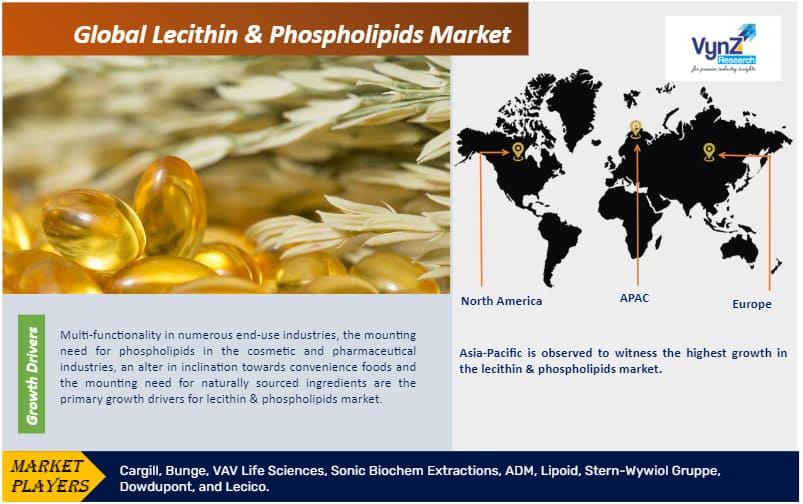| Status : Upcoming | Report Code : VRFB11006 | Industry : Food & Beverage | Available Format :

|

Global Lecithin & Phospholipids Market – Analysis and Forecast (2025-2030)
Industry Insights by Source (Soy, Rapeseed, Egg, Sunflower, and Other Sources), by Type (Fluid Lecithin, Modified and De-Oiled Lecithin), and by Application (Feed, Industrial, Food, Healthcare, Nutrition & Supplements, Pharmaceuticals and Others)
Industry Overview
Lecithin is a mixture of phospholipid and emulsifier, attained from the egg yolk, vegetables, and soybean. In addition, phospholipids are separated from the same source of base. Lecithin & phospholipids are widely applicable in nutrition & supplements pharmaceuticals, cosmetics, and others. The mounting need for phospholipids in the cosmetic and pharmaceutical industries and the mounting need for alternative sources of lecithin are the major factors driving the growth of the Lecithin & Phospholipids Market. The market has witnessed high demand for de-oiled lecithin due to its nutritional benefits to consumers.

Lecithin & Phospholipids Market Segmentation
Lecithin Market Insight by Source
Based on source, the lecithin market is subdivided into soy, rapeseed, egg, sunflower, and other sources. Among all sources, the sunflower segment is expected to grow at the fastest rate in the market due to concerns about health problems associated with the ingesting of genetically modified products, extensive availability of sunflower in European countries, and stringent regulations. In addition, the soy segment accounted for the largest share of the market due to the inexpensive extraction process, the upsurge in the cost of cocoa butter, and the adequate obtainability of soybeans.
Lecithin Market Insight by Type
Based on type, the market is subdivided into fluid lecithin, modified and de-oiled lecithin. Among all types, the de-oiled lecithin segment is expected to grow at the fastest rate in the market due to the easiness of handling and providing nutritional benefits to consumers. Moreover, the de-oiled lecithin is used in dietary foods, convenience food, bakery products, and confectionery products driving the growth of the de-oiled lecithin segment.
In addition, the fluid lecithin segment accounted for the largest share in the market due to the augmented need for industrial application and the mounting requirement for fluid lecithin from the feed industry in European countries.
Lecithin Market Insight by Application
Based on the application, the market is subdivided into feed, industrial, food, and healthcare. Among all applications, the feed segment accounted for the largest share in the market due to the mounting need for soy lecithin in the feed segment and the shift in inclination to protein-rich diets in developing countries such as China. The food segment is further subdivided into baked goods, confectionery products, convenience foods, and others.
Phospholipids Market Insight by Source
Based on source, the market is subdivided into soy, egg, and other sources. Among all sources, the soy segment accounted for the largest share in the phospholipids market due to the augmented need for natural sources in the cosmetics and pharmaceutical industry.
Phospholipids Market Insight by Application
Based on application, the market is subdivided into nutrition & supplements, pharmaceuticals, and others. Among all applications, the nutrition & supplements segment accounted for the largest share in the phospholipids market due to the constant upsurge in the per capita income and an upsurge in health alertness amongst consumers for natural ingredients.
Global Lecithin & Phospholipids Market Report Coverage
|
Report Metric |
Details |
|
Historical Period |
2018 - 2023 |
|
Base Year Considered |
2024 |
|
Forecast Period |
2025 - 2030 |
|
Market Size in 2024 |
U.S.D. XX Billion |
|
Revenue Forecast in 2030 |
U.S.D. XX Billion |
|
Growth Rate |
XX% |
|
Segments Covered in the Report |
By Lecithin Market by Source, By Lecithin Market by Type, By Lecithin Market by Application, Phospholipids Market by Source and Phospholipids Market Insight by Application. |
|
Report Scope |
Market Trends, Drivers, and Restraints; Revenue Estimation and Forecast; Segmentation Analysis; Impact of COVID-19; Companies’ Strategic Developments; Market Share Analysis of Key Players; Company Profiling |
|
Regions Covered in the Report |
North America, Europe, Asia-Pacific, Middle East, and Rest of the World |
Industry Dynamics
Lecithin & Phospholipids Market Growth Drivers
Multi-functionality in numerous end-use industries, the mounting need for phospholipids in the cosmetic and pharmaceutical industries, an alter in inclination towards convenience foods, and the mounting need for naturally sourced ingredients are the primary growth drivers for the lecithin & phospholipids market.
The mounting need for alternative sources of lecithin, the mounting need for feed and food applications and funding in the development of industrial applications are also facilitating the growth of the lecithin & phospholipids market.
Lecithin & Phospholipids Market Challenges
Health matters or allergies concerning the utilization of soy lecithin, changing the cost of raw materials, and concerns related to the adverse impact of GMO soy lecithin are the major challenges for the growth of the lecithin & phospholipids market.
Lecithin & Phospholipids Industry Ecosystem
Globally, the manufacturing companies trying to enter the lecithin & phospholipids market must maintain stringent regulatory standards. This offers an edge to the established players in the industry competition. Moreover, the high level of capital requirement also poses a major barrier to the entry of new players in the lecithin & phospholipids market.
Lecithin & Phospholipids Market Geographic Overview
Geographically, Asia-Pacific is observed to witness the highest growth in the lecithin & phospholipids market due to alterations in consumer’s inclination towards natural ingredients. In addition, augmented the need for bakery products such as cookies, pastries, and cakes, mounting alertness about health, the expanding aquaculture industry, augmented the need for personal care products and cosmetics and an upsurge in the young population are also creating a positive impact on the lecithin & phospholipids market growth in the region.
Lecithin & Phospholipids Market Competitive Insight
Key players in the lecithin & phospholipids market are catering to the demand by investing in new product launches in their product portfolio across the globe. Cargill introduced de-oiled lecithin products to complete its product portfolio of GMO and non-GMO lecithin products. Cargill, Bunge, VAV Life Sciences, Sonic Biochem Extractions, ADM, Lipoid, Stern-Wywiol Gruppe, Dowdupont, and Lecico are the key players offering lecithin & phospholipids.
Frequently Asked Questions
Purchase Options
Latest Report
Research Methodology
- Desk Research / Pilot Interviews
- Build Market Size Model
- Research and Analysis
- Final Deliverabvle
Connect With Our Sales Team
- Toll-Free: 1 888 253 3960
- Phone: +91 9960 288 381
- Email: enquiry@vynzresearch.com
Lecithin & Phospholipids Market
